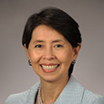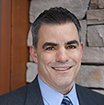Steering Committee
Emily Chew, MD
 Emily Y. Chew, MD is the director of the Division of Epidemiology and Clinical Applications and the deputy clinical director at the National Eye Institute (NEI), National Institutes of Health (NIH). Dr. Chew obtained her M.D. from the University of Toronto in 1977. She completed her ophthalmology residency at the University of Toronto and was board certified in ophthalmology in 1983. Dr. Chew then went to the Wilmer Eye Institute at Johns Hopkins University and the University of Nijmegen in the Netherlands to complete her medical retina fellowships. She was an assistant professor in the Department of Ophthalmology at the University of Toronto from 1983 to 1986. In 1987, Dr. Chew joined the Clinical Trials Branch at the NEI. Currently, Dr. Chew is the director of the medical retina fellowship program at the NEI.
Emily Y. Chew, MD is the director of the Division of Epidemiology and Clinical Applications and the deputy clinical director at the National Eye Institute (NEI), National Institutes of Health (NIH). Dr. Chew obtained her M.D. from the University of Toronto in 1977. She completed her ophthalmology residency at the University of Toronto and was board certified in ophthalmology in 1983. Dr. Chew then went to the Wilmer Eye Institute at Johns Hopkins University and the University of Nijmegen in the Netherlands to complete her medical retina fellowships. She was an assistant professor in the Department of Ophthalmology at the University of Toronto from 1983 to 1986. In 1987, Dr. Chew joined the Clinical Trials Branch at the NEI. Currently, Dr. Chew is the director of the medical retina fellowship program at the NEI.
Dr. Chew is a medical retina specialist and has had extensive experience in designing and implementing clinical trails (of Phases 1, 2 and 3) at the NIH Clinical Center. Dr. Chew has a strong clinical and research interest in diabetic eye disease and age-related eye diseases. She has thoroughly worked on analyzing the data from the Early Treatment Diabetic Retinopathy Study (ETDRS) and she continues to manage and analyze data from the Age-Related Eye Disease Study (AREDS). Dr. Chew works on a number of diabetes studies to evaluate genetic associations with diabetic eye disease. In addition, she is working on a large clinical trial called the Actions to Control Cardiovascular Risk in Diabetes (ACCORD), testing the effects of tight control of blood sugar, blood pressure and lipid concentration in the blood on diabetic eye disease.
Currently, Dr. Chew is the study chair for the Age-Related Eye Disease Study 2 (AREDS2), a Phase 3 study that is investigating the use of lutein/zeaxanthin (found in leafy greens such as kale) and/or omega-3 polyunsaturated fatty acids as treatment for age-related macular degeneration (AMD) and cataracts. AMD and cataracts are the two leading causes of blindness in America. Dr. Chew is also interested in the eye complications of von Hippel-Lundau disease and has collaborated with the scientific team called VHL to increase the number of clinical trials investigating this rare disease. For Dr. Chew any disease that causes blindness is of great importance, no matter how common.
A. Paul Chous, MA, OD, FAAO, CDE
 Dr. Chous completed his undergraduate education at Brown University and UC Irvine, and then received his Masters and Doctorate of Optometry degrees from UC Berkeley. He has a private practice specializing in diabetes eye care and education in Tacoma, WA. He is the author of Diabetic Eye Disease: Lessons From a Diabetic Eye Doctor, (2003), a feature writer for the web sites dLife.com and diabetesincontrol.com, editorial advisor to Review of Optometry and Optometry Times, and an adjunct instructor at Western University of Health Sciences. Dr. Chous has authored more than one hundred articles on diabetes and diabetic eye disease.
Dr. Chous completed his undergraduate education at Brown University and UC Irvine, and then received his Masters and Doctorate of Optometry degrees from UC Berkeley. He has a private practice specializing in diabetes eye care and education in Tacoma, WA. He is the author of Diabetic Eye Disease: Lessons From a Diabetic Eye Doctor, (2003), a feature writer for the web sites dLife.com and diabetesincontrol.com, editorial advisor to Review of Optometry and Optometry Times, and an adjunct instructor at Western University of Health Sciences. Dr. Chous has authored more than one hundred articles on diabetes and diabetic eye disease.
Anne Peters, MD
 Anne Peters, MD, is Professor of Medicine at the Keck School of Medicine of USC and Director of the USC Clinical Diabetes Programs. Dr. Peters earned her medical degree from the Pritzker School of Medicine at the University of Chicago and performed an internal medicine residency at Stanford University and an endocrinology fellowship at Cedars-Sinai Medical Center. She previously directed the clinical diabetes programs at Cedars-Sinai and UCLA. Her research has focused on testing new approaches for diagnosing and treating diabetes and developing systems of care to improve outcomes in diabetic populations.
Anne Peters, MD, is Professor of Medicine at the Keck School of Medicine of USC and Director of the USC Clinical Diabetes Programs. Dr. Peters earned her medical degree from the Pritzker School of Medicine at the University of Chicago and performed an internal medicine residency at Stanford University and an endocrinology fellowship at Cedars-Sinai Medical Center. She previously directed the clinical diabetes programs at Cedars-Sinai and UCLA. Her research has focused on testing new approaches for diagnosing and treating diabetes and developing systems of care to improve outcomes in diabetic populations.
She has published over 200 articles, reviews, and abstracts and three books on diabetes. She has been an investigator on over 40 research studies and has spoken at over 400 programs throughout the US as well as internationally. She has served on many committees for the ADA and other organizations. Currently she is the chair of the Endocrine Society Committee on Diabetes Devices and is on the EASD/ADA Technology Safety Committee. Additionally, she is a member of the JDRF Panel on Management of Exercise in Type 1 Diabetes. She is a member of the ABIM Endocrinology Subspecialty Board. She consults for many entities, including the FDA, Optum Rx and CVS/Caremark to help guide the development and use of treatments for diabetes.
Charles Wykoff, MD, PhD
 Charles Wykoff, MD, PhD, graduated Phi Beta Kappa from MIT, received his PhD from Oxford University in England while on a Marshall Scholarship, and his MD from Harvard Medical School. As a medical student he co-authored the book Fighting Global Blindness. While pursuing vitreoretinal training at Bascom Palmer Eye Institute he was awarded a Heed Fellowship, the Ronald G. Michels Fellowship Award, and served as Chief Resident/Co-Director of Ocular Trauma.
Charles Wykoff, MD, PhD, graduated Phi Beta Kappa from MIT, received his PhD from Oxford University in England while on a Marshall Scholarship, and his MD from Harvard Medical School. As a medical student he co-authored the book Fighting Global Blindness. While pursuing vitreoretinal training at Bascom Palmer Eye Institute he was awarded a Heed Fellowship, the Ronald G. Michels Fellowship Award, and served as Chief Resident/Co-Director of Ocular Trauma.
Dr. Wykoff has extensive expertise in clinical trial design and coordination. His research interests pertain to angiogenesis and retinal vascular diseases including age-related macular degeneration, diabetic retinopathy, and venous occlusive diseases, as well as vitreoretinal surgery topics such as retinal detachment and macular surgery. Dr. Wykoff has written and published over 120 peer-reviewed scientific manuscripts, book chapters, national meeting presentations and abstracts. Dr. Wykoff is Director of the Retina Consultants of Houston and Houston Methodist Hospital joint Argus II retinal prosthetic program – the only Gulf Coast site approved for surgical implantation of this unique technology for patients blind from retinitis pigmentosa. Dr. Wykoff is Co-Director of the Greater Houston Retina Research Foundation, was awarded the American Academy of Ophthalmology Achievement Award in 2015 and is an elected member of the Retina Society and the Macula Society. He also serves as the Academic Program Director for the Vit-buckle Society Annual Meeting, and is a member of the AAO, ARVO, ASRS and FACS.
